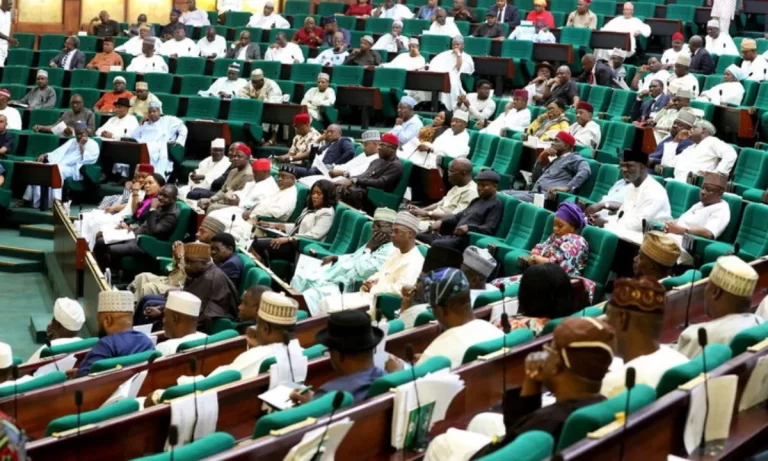The House of Representatives has on Wednesday, at its plenary, passed through second reading, a Bill seeking to establish a National Tax Crimes and oversight Commission, to address revenue leakages in the payment of taxes in Nigeria.
The Bill, titled “A Bill for an Act to Establish the National Tax Crimes and Oversight Commission,” successfully passed its second reading.
Spearheaded by the Deputy Speaker of the House, Rt. Hon. Benjamin Okezie Kalu, along with support from eight other lawmakers, the proposed legislation seeks to create a specialized body tasked with overseeing tax matters and combating illicit practices contributing to revenue losses.
In presenting the bill’s general principles, Hon. Felix Uche Nweke, one of the co-sponsors, stated the urgent need to tackle irregularities in tax assessment, reporting, and remittances.
Nweke pointed out instances of collusion between tax authorities and citizens leading to underpayment, as well as tax evasion facilitated by both domestic and multinational entities.
He Further stated the detrimental impact of revenue diversion by unscrupulous tax officials, necessitating robust measures to safeguard public funds.
The lawmaker also said that leakages also occur where taxes collected are not remitted to government coffers, or do not get the total amount of taxes collected as a result of revenue diversion by fraudulent staff of tax authorities.
Central to the proposed commission’s mandate is the investigation, audit, and prevention of tax-related crimes, aimed at enhancing fiscal transparency and accountability.
Stating the importance of a fair and efficient tax administration system, Nweke reiterated that the bill’s objective is to strengthen compliance, deter fraud, and protect taxpayers’ rights.
Crucially, proponents of the legislation stress that its enactment is not about increasing taxation but rather ensuring the integrity of the tax system and promoting economic stability.
Nweke stated that by establishing an independent oversight body, Nigeria aims to align with global best practices and enhance public confidence in its revenue administration.
He outlined the commission’s role in upholding the fundamental principles of a sound tax system, including fairness, adequacy, simplicity, transparency, and administrative ease.
Drawing parallels with similar agencies in other jurisdictions, he stated the need for a responsive and accountable mechanism to address taxpayer grievances promptly.
He stressed that the bill seeks to promote economic efficiency and effective tax administration system, detect and deter evasion, fraud and abuse in Nigeria’s tax administration system and to protect taxpayer’s rights.
According to Nweke, the establishment of the National Tax Crimes and Oversight Commission is a strategic move to enhance fiscal resilience and not about increasing taxation.
Part of his speech reads, “This bill was read the first time on Thursday, October 12, 2023. Mr. Speaker, Honourable Colleagues, the amount of revenue available to any government determines the extent to which such Government may be able to provide public goods and services.
“It is a pointer to how far a nation can ensure her growth and development. While taxation is considered the most important means of generating public revenue, it is worthy of note that nations that strive to develop aim at putting in place a fair, just, efficient and simplified tax administration system which builds confidence amongst the citizens and also motivates and encourages them to pay their taxes.
“While it is one thing to fix the amount of taxes to be paid, it is another for tax collection authorities and assessors to determine the right amount of taxes to be paid in accordance with the provisions of extant tax laws.
“This will definitely contribute to our national security through prevention of tax related crimes, prevention of illicit financial flow derived from tax evasion, international tax schemes, cybercrime, etc.
“The Tax Crimes and Oversight Commission will not function as a law court, it will not duplicate the functions of the Tax Appeal Tribunals established in accordance with section 59(1) of the Federal Inland Revenue Service (Establishment) Act, 2007 and it will not be saddled with any form of quasi-judicial functions.
“The Commission will primarily focus on the oversight of the tax administration system, ensuring that the tax authorities discharge their duties within the ambit of the laws: protecting, promoting and guaranteeing taxpayer’s rights, where necessary, ensuring the prosecution of corrupt and fraudulent tax officials, ensuring the complete remittances of all public revenues, ensuring the increase of public revenue not through the introduction or increment of taxes but through friendly and appropriate taxation, among other things.
“The Commission will ultimately ensure that the five basic qualities of a good tax system, which include fairness, adequacy, simplicity, transparency and administrative ease, are entrenched as part of global best practice.
“Similarly, independent tax auditing and investigating organizations exist in other countries; such as the Treasury Inspector General for Tax Administration (TIGTA) of the United States and the Inspector-General of Taxation and Ombudsman (IGT/0) of Australia.
“Similar Organizations exist in Ghana, Kenya, South Africa, etc. There is a need to put in place an effective system which oversees tax administration in Nigeria, a system which can address taxpayers’ grievances and complaints promptly and without hassles, a system which will be so friendly and that can encourage and raise people’s willingness to pay their taxes.”
